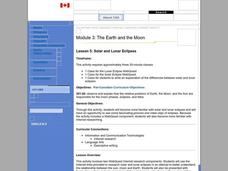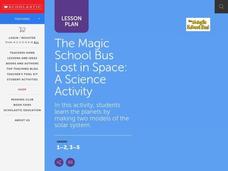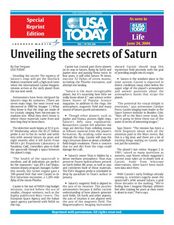Curated OER
SETI WebQuest and the Drake Equation
Learners complete a WebQuest where they research the Internet for extraterrestrial intelligence. In this extraterrestrial lesson plan, students also explore how the Drake Equation can predict the occurrence of life elsewhere.
Curated OER
Solar and Lunar Eclipses
Students complete a WebQuest in order to better explain solar and lunar eclipses. They observe images and videos of eclipses from around the world.
Curated OER
Solar and Lunar Eclipses
Young scholars examine eclipses. In this eclipse lesson, students investigate solar and lunar eclipses. Young scholars complete a WebQuest and write a descriptive summary of eclipses. Lesson references a WebQuest, but does not include a...
Curated OER
Cosmic Rays
Students study cosmic rays and the energy behind them. In this atmospheric lesson students complete a cosmic ray telescope project.
Curated OER
Be A Planet
Students identify the name, order and attributes of the planets. They role play the position of planets, and draw pictures of the planets as well.
Curated OER
Comets And Meteor Showers
Students fill in a diagram of a comet. They listen to a short lecture, view flash animation descriptions of comets and meteors and then use the presented information to complete a worksheet.
Curated OER
Hubble Space Telescope Webquest
Young scholars research the Hubble Space Telescope. In this Hubble Space Telescope instructional activity, students complete a webquest about the Hubble Space Telescope.
Curated OER
World In Motion Curriculum
Middle schoolers explore the night sky and its solar system. Using a Digitarium planetarium system, students observe four constellations. They discover the phases of the moon and eclipses. Middle schoolers recognize the difference...
Curated OER
Sky Stories Curriculum
Students investigate the stories told by ancient cultures about the constellations. They listen to stories told by the Greeks and Romans. The classroom should have posters of constellations for the lesson and the teacher performs...
Curated OER
Finding Jupiter's Moons
Students explore Jupiter's Moons. They calculate and predict the location of Jupiter's 4 large moons. In addition, they draw Jupiter with its moons correctly shown for the time of the observation.
Curated OER
Three D Constellations
Students are introduced to both celestial coordinates and to the first rung on the distance determination ladder. They convert spherical coordinates to Cartesian coordinates to construct a three dimensional model of a constellation...
Curated OER
Best of the Solar System
Students visit a site which provides images to be analyzed. Notes are taken and planets are named based on observed features and observations. Using peer review, they try to determine the identity of the planets. They are free to browse...
Curated OER
The Solar System
High schoolers construct a sketch of the planets in our solar system using concentric circles and angles. In this solar system lesson plan, students plot the position of each planet on concentric circles using graph paper. The sun is...
Curated OER
Moons Of The Solar System
Learners investigate the solar system and its moons. They conduct research in groups to find information. Also the teacher uses models of the planets in order to teach different facts about the solar system through the use of...
Curated OER
How Do We Explore Strange Environments?
Young scholars identify and label the different parts of a robot, rover, or a spacecraft. They discuss and record all of the features their robot will need to accomplish its mission and be able to explain why they chose these features...
Curated OER
#22 Frames of Reference: The Basics
Students explore the concept of frames of reference in physics.
Curated OER
The Celestial Sphere
High schoolers are introduced to the celestial sphere, describing its apparent rotation and the special role of the pole star.
Curated OER
Frames of Reference: The Basics
Learners learn the concept of frames of reference in physics. They examine how two frames of reference, each moving with respect to the other with a constant velocity v (constant speed, constant direction).
Curated OER
Day and Night
Students using experiments try to demonstrate how observations can be affected by the cycles of night and day.
Curated OER
What are Stars?
Young scholars research the solar system and it's characteristics. For this solar system lesson, students are broken into 4 groups, each assigned a specific part of the solar system. Young scholars use the Internet to research their...
Curated OER
The Magic School Bus Lost in Space
Young scholars learn along with Ms. Frizzle's class. In this Magic School Bus lesson plan, students explore outer space as they visit the Sun, Mercury, Venus, and Mars in order to learn about our solar system.
Curated OER
Sweet Candy Comets
Fourth graders use candy to make a comet. In this lesson, 4th graders examine the role comets have played throughout history, students watch NASA videos about comets and complete the lesson by making an edible model of a comet. This...
Curated OER
Unveiling the Secrets of Saturn
Students read and study an article then answer questions on Saturn. In this investigative lesson students identify ways space exploration has helped humanity and then they search the Internet for space pictures and sketch a drawing of...
Curated OER
Habitable Zones
Students focus on stellar luminosities to estimate size of habitable zones, map out habitable zone around hot light bulbs that serve as models of stars, investigate how size of model "habitable zone" around light bulbs depends on...

























